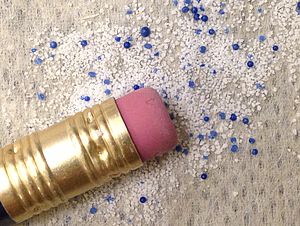Vermont House Votes to Ban Microbeads

Plastic microbeads range in size but are usually one millimeter or smaller. Photos courtesy of Alliance for the Great Lakes.
Earlier this week the Vermont House unanimously approved H.4, a bill to ban the manufacture and sale of harmful plastic microbeads from personal care products and over the counter drugs. These plastic beads are problematic because they wash down drains, slip through wastewater treatment plants and end up in our waterways. Fish feed on this plastic junk food, mistaking the tiny beads for fish eggs. The plastics attract waterborne toxins which can be passed up the food chain to fish, wildlife and ultimately humans. Scientists have found high concentrations of plastics in U.S. waterbodies. In 2012 researchers found microbead densities of 466,00 pieces per square kilometer in a section of Lake Erie. Microbeads have been found on Lake Champlain beaches.
"We don't need plastic microbeads to clean our faces, teeth or bodies," stated LCC Executive Director Lori Fisher. "There are safer, bio-degradable and non-polluting products that do a fine job of keeping us clean without taxing our wastewater treatment systems, degrading our waterways, and confusing the fish. Microbeads can't be removed from our waterways once they are there, we must keep them from getting into the water in the first place."
"Responsible companies already use the many safe, cost-effective, and natural alternatives to plastic microbeads," noted Martin Wolf, Director of Sustainability and Authenticity at Seventh Generation. "Why should Vermonters have to pay to clean-up after companies that aren't responsible?"
The Vermont House bill would ban the manufacture of microbeads by December 31, 2017 and the sale of personal care products and over-the-counter drugs containing them by the following year. It still needs Senate approval. LCC has been working in support of the legislation with colleagues at Rozalia Project, Seventh Generation, Vermont Conservation Voters, and Vermont Public Interest Research Group.
Take Action
Please help usher the bill forward to passage by contacting your senators and urging them to support H.4 as it came over from the House. Click here for further background on the issue. Additionally, be sure that you're not inadvertently using personal care products with plastic microbeads. There are plenty of effective soaps, toothpastes and body scrubs already on the market that don't use plastics as cleaning agents. Common natural alternatives for exfoliates and abrasives include ground nut shells, jojoba, oatmeal, sea salt and almond meal. Read product labels carefully and avoid anything with "polyethylene", "polypropylene", or "polyolefin" in the ingredients.
